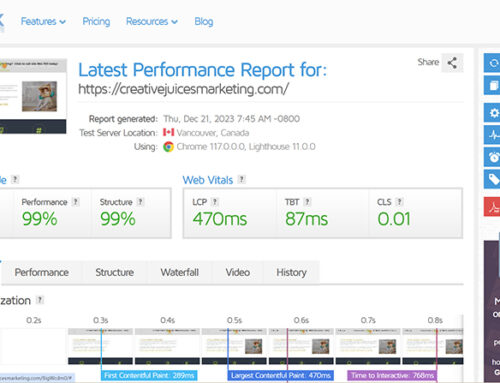 Google loves a website with built-in and well thought out SEO (search engine optimization). There are many other ways to improve your site’s optimization that SEO Experts will try to sell you – digital advertising, pay-per-click (PPC) ads … these have merit, but can’t compare to an already optimized from head-to-toe website. SEO is important for businesses because it helps you attain visibility for search queries organically. This helps you earn rankings organically without paying for it time and time again. Ranking well in search results for queries related to your content, products, or services can increase your website traffic. This can translate into revenue if you convert prospects into customers. If you want to know how to make Google love you, keep reading.
Google loves a website with built-in and well thought out SEO (search engine optimization). There are many other ways to improve your site’s optimization that SEO Experts will try to sell you – digital advertising, pay-per-click (PPC) ads … these have merit, but can’t compare to an already optimized from head-to-toe website. SEO is important for businesses because it helps you attain visibility for search queries organically. This helps you earn rankings organically without paying for it time and time again. Ranking well in search results for queries related to your content, products, or services can increase your website traffic. This can translate into revenue if you convert prospects into customers. If you want to know how to make Google love you, keep reading.
Generally speaking, the more relevant your site content is to users searching for certain keywords, the higher within the Search Engine Results Page (SERP) you will appear. On-site SEO is the process of optimizing the website itself. Google looks at both the public face of your website and the behind the scenes coding and technical set-up, so if you’re thinking either are unimportant to your overall SEO, you’d be wrong. Creative Juices Marketing does NOT specialize in SEO, but we hold current SEO expert certifications and we stay current in all of the new SEO trends. We believe that the best way to set your business up for online success is to build your website with all of the right stuff from the very beginning and then analyze, update, and manage for any needed changes going forward. Google changes, industries change, online searching changes … it’s best to have an expert keep a watchful eye to make sure you’re keeping up. A maintenance fee of about $100 a month to take care of this and other programming updates is well worth it, in our estimation.
What is Google Ranking?
Google’s ranking metrics are designed to sort out billions of web pages to meet search intent by offering the most relevant and useful results to searchers within the shortest time possible. Domains acquire ranking through Google’s algorithmic process that considers different factors to evaluate the quality, relevancy, and utility of an answer to a search query.
Here are some of the top factors in Google Ranking. There are 200+ other factors that Google takes into account, but these are the ones that you should focus on first if you’re interested in knowing how to make Google love you:
- Quality Content: Google wants to show users high-quality, informative, and relevant content.
- Backlinks: Links from other websites to your website are very helpful. They act like votes of confidence. The more high-quality backlinks you have, the higher your website will rank.
- Technical SEO: The technical aspects of your website, such as its website speed, mobile-friendliness, and crawlability. Make sure that your website is technically sound so that search engines can easily index and understand your content.
- Keyword Optimization: The process of using relevant keywords throughout your website’s content. This helps search engines understand what your website is about.
- User Experience (UX): A measure of how easy and enjoyable it is for users to use your website. Google wants to show users websites that provide a good UX. If you have too many flying photos or shifting content, Google won’t like it.
- Social Signals: The more likes, shares, and other social interactions that your website’s content receives, the better. Make sure your website is built to encourage social interaction and that it’s easy to share it’s content.
- Brand Signals: Your website is the best representation of your brand. It allows you to build brand perception. Make sure that your site makes a solid brand impression so you are well-known and respected.
What Is SEO?
SEO is the process of improving a website’s ranking on the natural (unpaid) listings in Google. There are a number of factors Google considers when deciding where to rank a site, both on your website and externally. Hundreds of factors determine your position.
Google looks for relevant and helpful content within the body text of a page along with your page titles, header tags and a number of other factors. One of the major factors Google uses to rank websites is their popularity, or more specifically the number of external links pointing at them. The more links you have from relevant and authoritative websites, the higher you’ll rank.
Google doesn’t like people gaming the system and building links. They expect you to create content that people will naturally want to share and link to. It is smart to utilize a range of social media and content marketing techniques to help earn the links you require to climb above your competitors. Also, utilizing your website URL in every online listing of your business, every social media account and any other websites you might be connected to is extremely important.
Google provides a number of tools for your SEO arsenal. The most obvious is Google Analytics, which offers an in-depth analytics suite to help even the most basic user understand and improve traffic to their website. But Google Search Console gives the advanced search expert another perspective on planning and evaluating his or her search efforts and will help improve your website’s ranking In Google.
See also Importance Of Mobile Optimized Websites
Google Search Console: The Background
Google Search Console is essential for improving your Google ranking and for any strong SEO effort. It will help you see your website as Google sees it. The toolset gives you insights into what pages have been indexed on your site, what links are pointing to it, your most popular keywords, and much more. Having someone who knows how to use the search console and analyze your content is important.
A site that’s active on the Google Search Console has a better shot at being fully indexed and ranked well. There are also a number of deeper insights that can be turned into SEO tactical gold.
The Search Queries section is broken down into five main indicators:
- Query: Query gives you details on what keywords your site is currently ranked for. This is one of the fastest ways to decode whether your efforts to get on the map for a specific keyword are working. It’s important to remember that “rank for” means showing up in the SERPs – not necessarily actively attracting traffic (yet). This feature can help you quickly identify keywords that are relevant, but need a boost from linking or further content optimization.
- Impressions: If you’ve ever wondered how many people are seeing your website for a specific keyword search, this will tell you. This metric gives you a good sense of how many people are seeing specific sections of your content. This is another way to confirm the value of a keyword in addition to traffic data from the Google Keywords module and other tools.
- Clicks: Of the people who are seeing your site, how many are clicking? This information lets you know how many searchers seeing your site are taking action and clicking on your search result.
- CTR: Your CTR, or click-through rate, is the percentage of people that are clicking on your site in the search results. If your click-through rates are low, look at whether you can improve your meta description for that page. Can the content be made more relevant to the queries driving the most impressions for that page, or can you add a stronger call to action in the title tag or meta description? You should also consider the broader search landscape: is PPC activity driving traffic away from your branded results in the search, for example?
- Average Position: This metric tells you where your site typically ranks for each keyword. Since the vast majority of traffic goes to the sites in the top 2 positions for a given term, it’s helpful to see how you’re performing and the impact that has on your traffic.
See also Website Content Readability
Local SEO
Local SEO is about optimizing your website and related properties to increase local visibility and traffic. While it doesn’t apply to all businesses, it’s extremely important for those that have a local focus or a physical location.
Local SEO includes several factors, including optimizing your Google Business Profile, adding local business schema, researching and targeting local keywords, NAP (name, address, and phone number) citations, and more. The importance of search engine optimization for local businesses is unique. Your directory listings are important to your ability to be discovered, but monitoring them and making sure they’re accurate and effective also helps drive motivated customers to your business.
Focusing on organic search gives you the potential to attract even more traffic over time if you’re able to increase your rankings. Because a clear correlation between high rankings and high click-through rates.
Organic SEO is obviously a more cost-effective way to drive traffic to your website compared to paid digital advertising, but it also works really well when combined with digital advertising. With SEO, you have to spend on your website and on content production. But you don’t have to buy an ad placement.
Companies that invest in SEO tend to maintain or grow their results over time, even with reduced effort. But paid channels require continued ad spend to remain competitive. So if you want to know how to make Google love you, it starts with a great website built with great organic SEO from the ground up. Creative Juices Marketing and Advertising Agency is highly experienced in building search engine optimized websites that Google will really appreciate. Call us to learn more 434 964 7511.
See also Why You Need A Responsive Website




